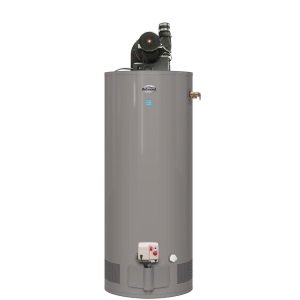- Review
- Best
- Tankless
- Tank-type
- Heat Pumps (Hybrids)
- RV Water Heaters
- Gas
- Electric
- Pool Heaters
- Solar
- Bosch
- Navien
- Noritz
- Paloma
- Rinnai
- Takagi
- American
- AO Smith
- Bradford White
- GE
- John Wood
- Reliance
- Rheem
- Richmond
- Ruud
- State
- US Craftmaster
- Hydronic Heating
- Troubleshooting
- Maintenance
- Parts
- Buy on amazon
- Sitemap
- What's New
- Privacy
- Disclaimer
- Contact
Natural Gas Water Heaters
Buying guide, Saving Tips

Natural gas water heaters are probably the most popular heating systems you can find in North America and Europe.
Natural gas is one of the cheapest forms of energy for residential use; it is clean, affordable, and heats the water quickly and efficiently. The more expensive gas option is propane, not as convenient to get, but still offering benefits as natural gas.
Need professional help with your water heater?
Get free quotes today!
The best known and widely used application for natural gas in homes is for heating and cooking. More than half of the North American and European population uses natural gas for home and water heating.
Since we have an abundance of natural gas available to use for our homes, and with the rising prices, we usually forget that there are many ways how to save on the heating operating costs and service.
Either you are renting a heater or using a new one, you will still have over 20-30%, on average, of your annual household energy bill that goes on water heating.
With the following steps that we recommend, you will save significantly, which will greatly impact your home budget. How much money you can save depends on you and your family members, your habits, and many other criteria; are you using natural gas tankless water heater or tank-type, are you heating water efficiently with the Energy Star recognized units or not.
How to reduce the operating costs of the gas-power water heater
- The recommended hot water temperature at the tap should be between 125 F and 130 F.
- Run the dishwasher only when having a full load.
- Rinse dishes with cold, not hot water.
- Use warm or cold water to wash and rinse clothing (unless you really need hot).
- Don't run hot water if you don't need it.
- Fix any drips you have on the faucet.
- Check for leaks on the heater or pipes.
- Insulate the water storage tank. If it is the gas-powered water heater, be careful not to obstruct the fresh air access, and do not block the pilot light. Use an insulating blanket, also known as an "insulation jacket."
- Wrap the pipes with the insulation foam.
- Reduce the shower pressure by installing a low-flow showerhead.
- Don't spend too much hot water on the bath; take short showers instead.
- Check the gas burner. A properly adjusted natural gas burner has a blue flame. If the flame is yellow or orange, that means abnormal combustion and not efficient heating.
- Regular maintenance is needed for efficient performance (like occasionally checking for sediments and flushing the system).
When talking about efficiency, if you have an old electrical and tank tape heater, maybe it is time to consider a natural gas water heater, high efficiency, and Energy Star qualified, such as Rinnai RUR98 or Rinnai RUC98. These models are eligible for government tax credit and rebates.
Also, it is good to be aware of family habits like do you need an abundance of hot water at once. You don't want to buy an oversized heater as the energy loss is higher, which is a waste of your money.
The natural gas tankless water heater is probably your best option, as it avoids the potential heat and energy losses like with the tank-type, and there are models with high efficiency of over 90%.
For your safety, always check the temperature before using hot water and keep the temperature around 120 F / 49 C.
Selecting tips
- Which type of natural gas water heater do you prefer or can use: tankless or tank-type, indoor or outdoor models.
- Decide what the capacity of the heater that will meet your needs is; for tankless - choose how many gallons per minute unit produces; for tank-type - what is the capacity of the tank, in gallons.
- Select the best venting option (power vent, direct vent, or atmospheric).
- Consider Energy Star or high-efficiency water heaters. Noritz, Takagi and Rinnai are the best in its class.
- Consider buying a condensing water heater or boiler, such as Rinnai.
- Check out the yellow tag, Energy Guide Label that shows how much it will cost you per year to operate the heater.
- Don't install the heater by yourself, find the qualified plumber, HVAC technician or qualified installer (they are knowledgeable and are familiar with national and local codes and regulations).
Installing and venting tips
As mentioned before, when using a natural gas water heater, due to the safety and per regulations, all the by-products of gas combustion have to be removed outside using the approved vents.
Atmospheric-vented gas water heaters are using a vertical vent pipe or chimney for the flue gases exhaust. This process works on pure physics; warmer flue gases will rise naturally through the chimney and out. Before you decide, we suggest you call the inspector to check the size and chimney features.
If the vertical chimney or venting is not an option, you can go with the direct vent or horizontally vented natural gas water heater. It can work in two ways, the flue gas goes out through the outside wall, bringing the air in for combustion.
Power vented option is using an electric fan as assistance to push the gases outside. This is a good option if your natural gas water heater has to be installed far from the outside wall (for the total length, check out the building code or the manual). Power vented water heaters, such as this AO Smith Vertex is a great example.
- Home
- Water heater review
- Natural Gas Water Heaters



